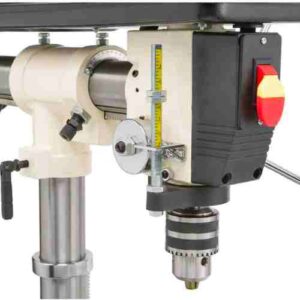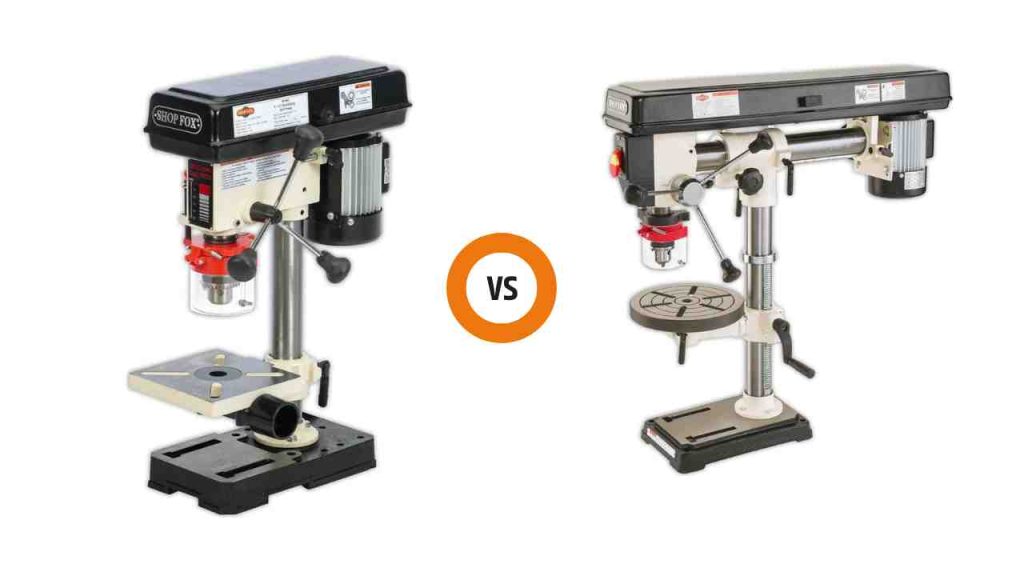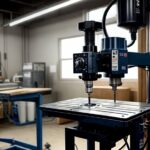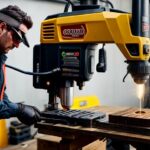The floor and bench drill presses are two of the most prevalent kinds of drill presses, but which one is best for you? Keep reading to discover more about these two kinds of drill presses and which one will best fit your requirements, whether you’re drilling holes in wood, metal, or plastic.
We’ll look at the benefits and drawbacks of floor and bench drill presses in this blog article so you can make an educated selection based on your requirements and tasks.
Comparison chart:
| Features | Floor Drill Press | Bench Drill Press |
| Size and Space | Large, takes up more space | Small, takes up less space |
| Power and Capacity | High power, high capacity | Lower power, limited capacity |
| Stability | More stable, better for larger projects | Less stable, better for smaller projects |
| Height Adjustments | Adjustable height | Limited height adjustments |
| Price | More expensive | More affordable |
| Portability | Heavy and harder to move | Lightweight and easy to move |
5 major differences between Floor and Bench drill presses:
- Size and Space: Floor drill presses are bigger and take up more space than bench drill presses, which are smaller and take up less. Bench drill presses are appropriate for smaller workshops or those with limited space, while floor drill presses are better suited for bigger workshops with plenty of room.
- Power and Capacity: Floor drill presses offer more power and capacity than bench drill presses. They are built for heavy-duty drilling, perfect for experts and individuals dealing with tougher materials. Bench drill presses, on the other hand, are intended for lesser drilling operations and are ideal for DIY enthusiasts or amateurs.
- Stability: Since floor drill presses are more stable than bench drill presses, they are better suited for bigger jobs requiring more accuracy. Bench drill presses may wobble or shift while drilling, affecting the precision of the hole.
- Height Adjustments: Adjustable height settings on floor drill presses enable you to alter the drill press height to meet the workpiece’s size. Bench drill presses, on the other hand, have restricted height adjustments and are thus less adaptable.
- Cost: Floor drill machines often cost more than bench drill presses. Due to their additional features and size, floor drill presses are more expensive to build and acquire. Bench drill presses, on the other hand, are less expensive and better suited to individuals on a tight budget.
Floor drill press:
The floor drill press is a flexible, strong instrument for heavy-duty drilling jobs. This freestanding machine is designed to endure and can operate with various materials, making it suitable for professional woodworkers and metalworkers.
Major Features:
- Huge size for stability and precision
- High power and capacity for heavy-duty operations
- Adjustable height for adaptability
- Built-in work light for increased visibility
- Spindle travel gauge for precision
Pros:
- More power and capacity than bench drill presses
- Height adjustment gives for increased adaptability.
- It is more stable than bench drill presses and appropriate for bigger jobs.
Cons:
- It requires more room than bench drill presses.
What is a floor drill press used for?
Floor drill presses are often used for drilling precise and accurate holes in materials such as wood, metal, and plastic. They have higher power and capacity than benchtop ones and can drill deeper holes, making them excellent for drilling through thicker and tougher materials.
Due to their excellent precision, stability, and capacity to handle huge workpieces, floor drill presses are also extensively employed in industrial applications such as manufacturing and construction.
 Bench drill press:
Bench drill press:
The bench drill press is a small, inexpensive instrument for DIYers and amateurs. This machine is intended for lightweight drilling activities and can work with various materials such as wood, plastic, and light metals.
Major Features:
- Small design for simple storage and transportation
- Reduced power and capacity for lighter drilling jobs
- Adjustable depth stop for precise drilling
- Built-in laser guide for increased accuracy
Pros:
- Less expensive than floor drill presses
- The compact size facilitates storage and travel.
- Suitable for mild drilling and DIY hobbyists
Cons:
- It has limited power and capacity, making it unsuitable for heavy-duty activities
Is a Benchtop drill press worth it?
Benchtop drill presses have less power and capacity than floor drill presses, making them unsuitable for heavy-duty drilling operations or experts. They can, however, drill through various materials, including wood, plastic, and light metals.
Finally, whether or not a tabletop drill press is worthwhile depends on your unique demands and budget. Consider the projects you’ll be working on, the materials you’ll be drilling with, and the amount of space you have in your workshop. If a tabletop drill press fulfills your requirements, it might be an excellent addition to your tool collection.
Similarities:
- Drilling Function: Drill presses, both floor and bench, is intended to drill holes in a variety of materials, including wood, plastic, and metal.
- Chuck Size: Both drill presses require a chuck to secure the drill bit, and the chuck size varies depending on the model.
- Drill Bits: Drill presses of both sorts employ a variety of drill bits, such as twist drills, spade bits, and hole saws, to mention a few.
- Depth Stop: A depth stop function is available on both floor and bench drill presses, allowing you to specify the depth of the hole you are drilling, which may increase accuracy and consistency.
- Adjustability: Floor and bench drill presses may be modified to fit a variety of materials and drilling requirements. Both kinds of drill presses, for example, may feature variable speed controls or changeable table angles.
Which is better Floor or Bench drill press?
Professionals and those working on bigger, more sophisticated tasks should use floor drill presses. They offer higher power, capacity, and stability and are intended for heavy-duty drilling activities. Floor drill presses may also be adjusted in height, making them more adaptable and suited for various jobs.
Bench drill presses, on the other hand, are ideal for DIY enthusiasts and amateurs with minor drilling requirements. They are less expensive, take up less room, and are simpler to transport. Bench drill presses are also more user-friendly and better suited for minor jobs or drilling in tight places.
Why floor press is better than Bench?
The benefits of floor drill presses versus bench drill presses are many. They offer more power and capacity, making them more suitable for heavy-duty drilling operations and materials. Moreover, floor drill presses offer changeable height settings, making them more adaptable and appropriate for various jobs.
Lastly, since floor drill presses are more stable than bench drill presses, they are excellent for bigger and more intricate jobs requiring higher accuracy. Overall, a floor drill press better matches your requirements if you are a professional or working on bigger tasks.
Frequently Asked Questions (FAQs)
1. Can I use a bench drill press for heavy-duty drilling tasks?
While bench drill presses are designed for lighter drilling tasks, they may not be suitable for heavy-duty drilling jobs due to their limited power and capacity. For heavy-duty drilling tasks, a floor drill press is a better option, as it offers more power and stability.
2. Can I drill metal with a bench drill press?
Yes, you can drill metal with a bench drill press, but it is better suited for drilling through lighter metals. For drilling through thicker or harder metals, a floor drill press with higher power and capacity is recommended.
3. What is the main advantage of a floor drill press over a bench drill press?
The main advantage of a floor drill press over a bench drill press is its higher power, capacity, and stability, making it more suitable for heavy-duty drilling tasks and professional use. Floor drill presses also offer adjustable height settings, which provide more flexibility for various projects.
4. Is a floor drill press suitable for a small workshop?
Floor drill presses are larger and take up more space than bench drill presses, so they may not be suitable for small workshops with limited space. However, if you have enough space and require a powerful drill press for heavy-duty tasks, a floor drill press can be a valuable addition to your workshop.
5. Can I use the same drill bits for both floor and bench drill presses?
Yes, you can use the same drill bits for both floor and bench drill presses, as long as the chuck size is compatible. Both types of drill presses can accommodate various drill bits, such as twist drills, spade bits, and hole saws, depending on the specific drilling task.
6. How do I choose between a floor and bench drill press?
To choose between a floor and bench drill press, consider your specific needs and requirements, such as the materials you will be drilling, the size of your projects, the available space in your workshop, and your budget. If you need a more powerful and stable drill press for heavy-duty tasks, a floor drill press is a better option. However, if you have limited space and require a drill press for lighter tasks, a bench drill press may be more suitable.
Final words:
Both the floor and bench drill presses have distinct benefits and drawbacks. Floor drill presses are more suitable for professionals and bigger tasks, while bench drill presses are less expensive and better suited for DIY enthusiasts and amateurs with lesser drilling requirements. While deciding between these two kinds of drill presses, evaluating your demands and needs is critical.
 Consider the materials you will be drilling, the size of your projects, the available area, and your budget when picking between the two. You can make an educated selection that best matches your requirements if you examine the advantages and drawbacks of each kind of drill press.
Consider the materials you will be drilling, the size of your projects, the available area, and your budget when picking between the two. You can make an educated selection that best matches your requirements if you examine the advantages and drawbacks of each kind of drill press.
- Where are WEN drill presses made? - April 2, 2023
- Where are Rikon drill presses made? - April 1, 2023
- Where are Powermatic drill presses made? - April 1, 2023







